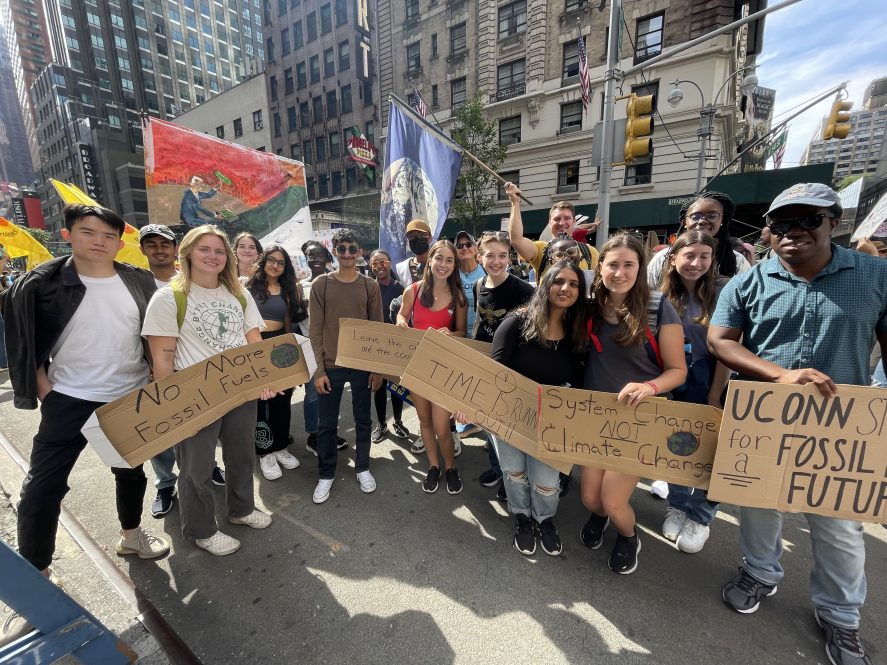Fossil fuels have been used to generate most of the energy humans use on an everyday basis for over 150 years. However, using fossil fuels has taken a large toll on humans and the environment. According to the Environmental and Energy Study Institute, fossil fuel impacts include climate change, ocean acidification, extreme weather, sea level rise, land degradation, plastic pollution, air pollution, water pollution, and health issues. It has also been shown that climate change and the burning of fossil fuels disproportionately affects Black and low income communities.
To address the United States’ use of fossil fuels, climate and environmental injustice, and the impacts of climate change, the March to End Fossil Fuels was held on September 17 in New York City. The goal of this march was to call on national leaders and policy makers, including President Joe Biden, to take action to stop the use of fossil fuels by declaring a climate emergency, stopping approvals of new fossil fuel projects, and providing a just transition to clean energy alternatives like wind and solar.
UConn students joined over 75,000 people at the march, which made this the largest climate mobilization since the start of the pandemic.
“Climate change is an existential threat. Just this summer, the smog in Connecticut was so bad that you couldn't go outside. We're beyond it being some abstract threat; it is real for us and needs to be just as real for [policy makers]. When 10,000 people are predicted to show up, and up to 75,000 were estimated to have marched, that sends a message to those in power,” said Adam Opin '24 (CLAS).
The march was endorsed by over 700 organizations, including the Center for Biological Diversity and Fridays for Future US and NYC, and featured speakers at the closing rally included Rep. Alexandria Ocasio-Cortez and UNICEF goodwill ambassador Vanessa Nakate. Students who attended the march felt that the march provided a valuable opportunity for their voices to be heard.
“I chose to go to show support for federal action to combat climate change. As a young voter, I feel it was necessary that our government hear the will of the people. I also went because I feel so strongly about addressing the climate crisis. I feel very abandoned by the generations before me that put young people in the position of needing to address such a crisis. I don't want to have to pass that burden on to the generations that will come after me. I am young and passionate, going to the march was the least I could do to fight for a better future,” said Monet Paredes '23( CLAS), a UConn senior majoring in political science and environmental studies.
The coordination of bringing UConn students to the march was the result of a coalition of UConn departments, including the Office of Sustainability, Political Science, Anthropology, Sociology, Geography, and Environmental Studies, as well as student groups like Fossil Fuel Free UConn.
“Fossil Fuel Free UConn is centered around climate activism. This includes locally at UConn and in the state of Connecticut, as well as at the federal and international levels,” said Lilly Adamo '24 (CLAS). “Attending this march [was] an opportunity to make our voices heard and as well as be a part of a network of climate activism across the country. Change cannot occur in a silo, therefore collaboration and partnership are crucial to making progress in addressing the climate crisis. This change then extends back to UConn itself where there needs to be a climate action plan and investment in addressing the role and responsibility the University has to address climate change.”
Students who attended the march felt that it was a life-changing and inspiring event, especially because youth voices were recognized and amplified.
“While we were marching, I was walking next to a small family with little kids. The kids couldn't have been older than 5 or 6 years old but they were there with their mom holding signs and chanting. They got the crowd to chant with them ‘Hey hey, ho ho, these fossil fuels have got to go,’” said Paredes. “As a young person myself I got emotional seeing these super young kids be a part of this march. That's how important it is that we address climate change. These kids have barely started their educational journey yet they are here chanting and marching for their future…To see youth supporting youth is a magical thing.”
Students and faculty who attended the march hope that they can bring the energy and enthusiasm, as well as the lessons they learned, from the march back to UConn. There is a consensus among students that they want UConn to do more as a university to address its impact on the environment and its use of fossil fuels.
“I hope that UConn will be able to formulate a plan and implement it to reach its goal of carbon neutrality by 2030, but furthermore act on a plan to become carbon-zero by 2040,” said Dylan Steer '25 (CLAS). “In addition, investments in fossil fuels by the UConn Foundation must be divested to show true commitment to a fossil fuel free future.”
Those that attended the march also hope that more students at UConn are inspired to get involved in climate action. There are many ways for students to do this, including joining student organizations, such as Fossil Fuel Free UConn, EcoHusky, and Clean Energy Society; sharing their thoughts at Board of Trustees meetings; attending Office of Sustainability events and participating in the office’s sustainability competitions like EcoMadness; and taking classes in the College of Agriculture, Health, and Natural Resources to learn more about fossil fuels and other environmental issues.
Written by Amanda Stowe, UConn Office of Sustainability Intern.



